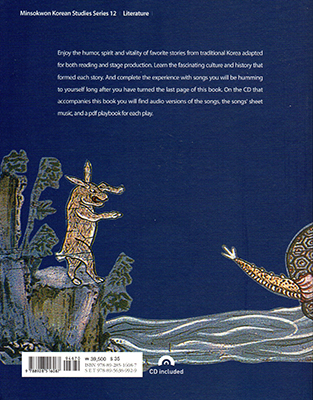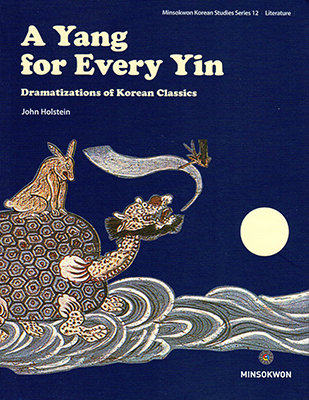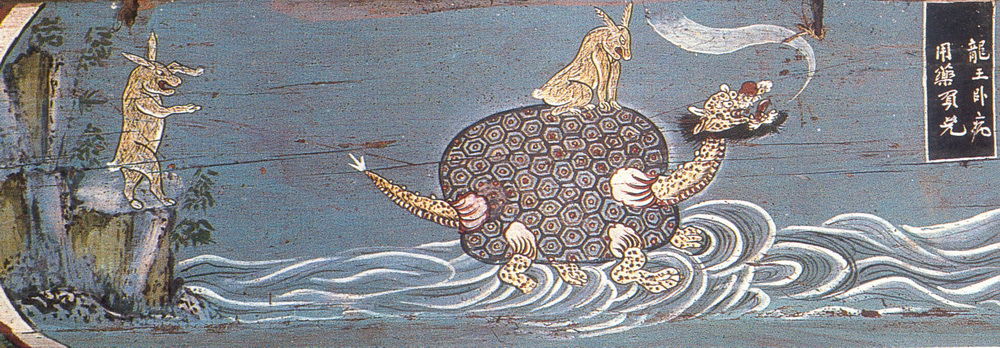A
Yang for Every Yin |
|
Dramatizations
of Korean Classics |
| |
|
|
| |
| |
|
| |
| John
Holstein. (2021). A Yang for Every Yin: Dramatizations of Korean Classics.
ISBN 978-89-285-1608-7. 351 pages. A CD is included. |
| |
| With this
book the general reader gains access to a few of Korea’s favorite
classics. These plays are based on stories from Korea in the 17th and 18th
centuries, and they are still being told in the twenty-first century, in
their original form but also on TV, stage and film. Four of the five plays
in this book are dramatizations of pansori, one of old Korea’s most
highly-developed performance arts. (You may already have heard about Chun
Hyang, Hungbu and his brother Nolbu, Hare and Tortoise and the Dragon King,
or Ong Go-jip.) The other play is based on the popular traditional short
story, Grandpa’s Wen. |
| |
| |
| |
|
| |
| Synopsis
of each play |
| |
| Harelip |
| In
the Palace of the East Sea the ten-thousand-year-old Dragon King is dying
from a disease which can be cured only with the liver of a hare. The King’s
faithful thousand-year-old Chief Minister Tortoise makes the difficult
and dangerous journey to land, where he succeeds (by playing on Hare’s
vanity) in luring her to the Sea Kingdom. When Hare discovers they want
her liver she claims that she took it out that morning and hid it away
for safekeeping. Tortoise reluctantly brings her back to land to get the
liver, but Hare escapes and then, mischievously adding salt to Tortoise’s
wound, gets him to accept three of her foul-smelling “instant concentrated
rabbit liver tablets” as a substitute for her liver. She bounces
off into the forest laughing, leaving Tortoise to return to the Dragon
King empty-handed. But hers is not the last laugh. |
| |
| |
| Grandpa
Lopside, a poor woodcutter with a wen on his right cheek, is caught in the
mountains by a cloudburst one day and forced to spend the night in a deserted
shack frequented by goblins. Just as the goblins are approaching the shack
Grandpa launches into a song to ward off the uneasiness he feels at being
alone in the spooky woods at night. The goblins, who love good singing but
are notoriously bad singers, burst in on him and demand more. At the end
of Grandpa’s song they offer him a sack of gold for the “song
bag” on his cheek. He insists it’s not a song bag; but they
think he’s just trying to keep it for himself. So they snatch it from
him and leave him the sack of gold. Within a few days Grandpa’s wen-bedecked
friend “Grandma” Lopside (as tone-deaf as the goblins) hears
that Grandpa has become rich, and in his greed schemes not only to get rid
of his wen but also to get some gold. He goes back out to the shack and
tries to deceive the goblins. Meanwhile the goblins have discovered that
Grandpa’s wen is not really a song bag. So Grandma Lopside, instead
of getting rid of his wen, ends up with Grandpa’s wen on his other
cheek. But this is not all he gets. |
| |
| Two Kins’
Pumpkins |
| Wealthy
Father has died, and first son Nolbu has control of the entire inheritance.
This mean and greedy Nolbu can’t stand the idea of sharing the inheritance
with his virtuous younger brother Hungbu. So he kicks Hungbu and Hungbu’s
whole family out of the house. They barely survive a year of hand-to-mouth
existence. Then a swallow, whose broken leg Hungbu has fixed, returns the
next spring with a reward of magic pumpkin seeds, and when Hungbu harvests
them in the autumn they yield a cornucopia which makes Hungbu even richer
than Nolbu. Nolbu and his wife hear about this and hunt down a swallow,
then break its leg and fix it so they can reap the same reward. The reward
they finally get, though, is not exactly what they had in mind. Virtuous
Hungbu, of course, comes to the rescue, and Nolbu turns over a new leaf
— in his own way. |
| |
| The Money
Bug |
| Rich Miser
Ong doesn’t know it, but when he has the monk Hakdaesa thrown out
of his house he is asking for trouble. And sure enough, trouble arrives
for Ong the very next day in the form of a walking, talking, spitting image
of himself, conjured by Hakdaesa to teach Ong a lesson. Phony Ong persuades
everyone that he is the real Ong, and the real real Ong gets thrown out
of his own house. Finally, after several months’ wandering and begging
he repents; Hakdaesa decides he has learned his lesson and tells Ong to
go on back home. What is he going to find, though, when he gets there? |
| |
| Chun Hyang
Song |
| When Mong
Yong, the son of an aristocrat, falls into true love with Chun Hyang, the
daughter of a gisaeng, there is no way that trouble is not going to happen.
And it does. Chun Hyang’s mother allows the two lovers to marry. Too
soon, though, Mong Yong has to leave for Seoul to take the higher civil
service exam. He vows his undying love and loyalty. When the unprincipled
local magistrate Byon Satdo sets eyes on Chun Hyang, the term undying love
takes on special meaning: she has to choose between Mong Yong and life. |
| |
| |
| |


